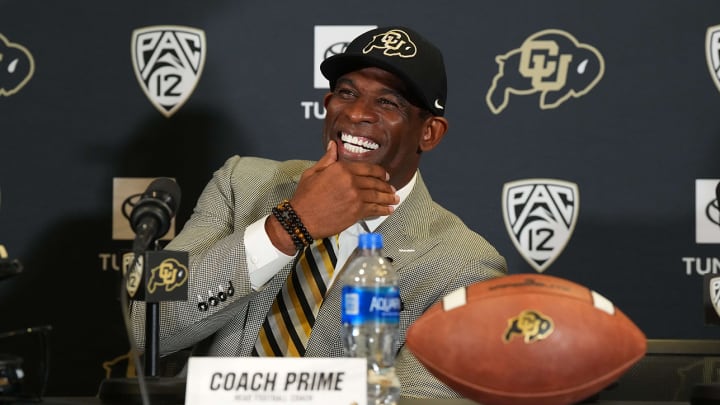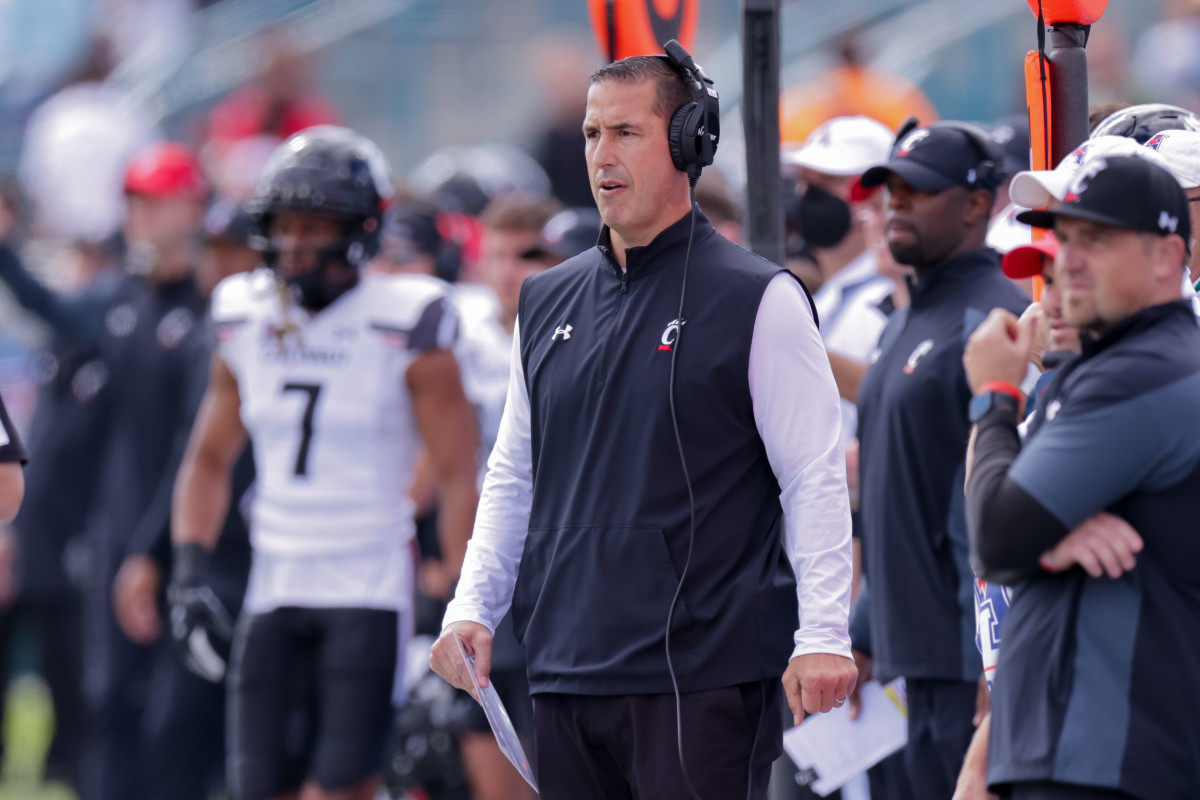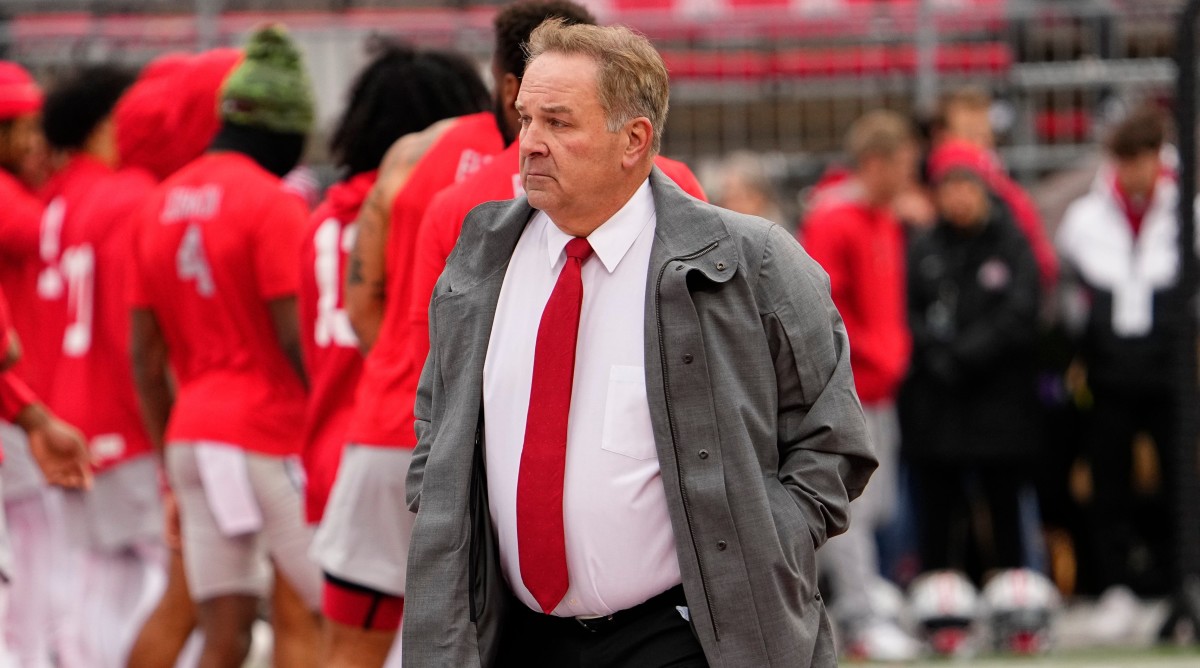The Biggest Question for Each New College Football Coach

The dust has mercifully settled on the 2022–23 college football coaching hiring cycle (we think). The latest Silly Season left us with 24 coaches leading new programs. It’s quite the range of characters.
We have former TV analysts coaching at Colorado (Deion Sanders) and UAB (Trent Dilfer), once-fired coaches at FAU (Tom Herman) and Nebraska (Matt Rhule), and a 32-year-old hired at Arizona State (Kenny Dillingham).
In the SEC, Hugh Freeze will make his return to the spotlight at Auburn, and 36-year-old Zach Arnett will make his head coaching debut at Mississippi State as the youngest coach in that league in more than 30 years. Luke Fickell made the jump from Group of 5 to Power 5 at Wisconsin, and Troy Taylor is stepping up from FCS to the Pac-12 at Stanford.
Kevin Wilson and Barry Odom are back as head coaches at Tulsa and UNLV, respectively, and hotshot assistants like Alex Golesh (USF) and Ryan Walters (Purdue) landed head jobs. All of them have plenty of questions to answer at their new gigs, hurdles to leap and issues to solve.
We highlight the most important question for each new coach in FBS.

Luke Fickell, Wisconsin
Can the Badgers, finally, consistently beat the Big Ten big dogs?
Wisconsin hasn’t won a game against Ohio State since 2010 and hasn’t beaten Penn State since ’11, dropping 14 straight games against those two programs. Things are better against Michigan (3–3 in the last six meetings), but the point still stands: The Badgers have to be better to compete for the league title. Fickell built Cincinnati into a G5 power that advanced to the College Football Playoff in ’21. But this is a whole new landscape.
Jeff Brohm, Louisville
Will returning home work?
Coaches accept jobs for an assortment of reasons: money, school resources, recruiting territory, conference affiliation. But in this case, Brohm returned home. He was born in Louisville, attended high school there and played for the Cardinals. He served as an assistant there too. This one made too much sense. But home doesn’t always produce wins. Just ask Scott Frost.
Deion Sanders, Colorado
Will he back up the hype?
Prime Time has already made his mark in Boulder, and he hasn’t coached a single game. Season-ticket sales are blowing through record numbers. The program expects more people at its spring game this year than it has had in the last five years combined. Social interactions are way up, and so are merchandise sales. He’s brought in about 40 new players and has commitments from several of the country’s highest-ranked recruits. But will he win? At Jackson State, Sanders’s teams were far more talented than his competitors. That might not be the case in Boulder.
Making moves 📈 #CoachPrime | #GoBuffs pic.twitter.com/oImqOtW4hV
— Colorado Buffaloes Football (@CUBuffsFootball) February 25, 2023
Jamey Chadwell, Liberty
Can Chadwell get Liberty into the expanded playoff?
No, that is not a joke of a question. In fact, Liberty might have the biggest athletic budget and best resources and facilities of any Group of 5 program in the country. Now that the Flames are in a conference (C-USA), they are in position to qualify for the 12-team playoff starting in 2024. In the expanded playoff format, the highest-ranked Group of 5 champion gets an automatic bid. Given what Hugh Freeze did in Lynchburg, what Chadwell accomplished at Coastal Carolina and the bountiful resources, Liberty might just be the cream of the G5 crop.
Matt Rhule, Nebraska
Will he restore the Huskers like he did Temple and Baylor?
Matt Rhule, fresh off a failed stint in the NFL, won 10 games each of his last two seasons at Temple. He won 11 games in Year 3 at Baylor and finished No. 12 in the country with the Bears. He restored two programs that were somewhat broken when he got there. Sound familiar? Nebraska has finished with a losing record in six consecutive seasons.
Hugh Freeze, Auburn
How will he handle the scrutiny?
Freeze returns to the upper echelon of college football carrying with him baggage from his previous stops, most notably the NCAA infractions and escort service issues at Ole Miss. He has also in the past interacted with fans, detractors and others on social media—something that probably isn’t healthy. It’s time for Freeze to put the blinders on, keep his focus on football and do what he does best: coach.
Tom Herman, FAU
Can he conjure the success he had at Houston?
Tom Herman will take over at FAU three years after his firing from Texas. He’s had two offseasons to evaluate himself and prepare for his next gig, where the Owls are hoping he can unearth the magic sauce that saw him win 22 games in two years at Houston.
Kenny Dillingham, Arizona State
How will the youngest FBS head coach manage his first gig?
At age 32, Dillingham is the youngest head coach in FBS. He turned coordinator gigs at Auburn, then Florida State, then Oregon into returning home for his first head coaching job. A Phoenix native and Arizona State alum, Dillingham takes over a program that loaded up on new players this offseason (around 45). It’s wild to think a Power 5 head coach was just 10 years ago an assistant at the high school level, but here we are.
Ryan Walters, Purdue
Can defensive-minded Walters continue offensive creativity at Purdue?
Walters and his predecessor, Brohm, could not be more different. They are separated in age by 14 years. One is from Los Angeles (Walters), and the other from Kentucky (Brohm). But the biggest change in West Lafayette will be their difference in schematics. Walters, a former safety, has spent his life in football on the defensive side of the ball. Brohm, a former quarterback, has spent his on the offensive side. He was known for creatively devising offensive plays that kept Purdue in games against much more talented teams.
G.J. Kinne, Texas State
Can he win immediately like he did at the FCS level?
Kinne, the former Texas high school quarterback and NFL/Canadian league player, began his coaching career in … 2017! He has been a college coach for only six years and hasn’t yet been at one place longer than a single season. He started as a graduate assistant at SMU (’17), became an analyst at Arkansas (’18), had a low-level staff role with the Philadelphia Eagles (’19) and was offensive coordinator at Hawaii and UCF (’20 and ’21) before his first head job at Division II Incarnate Word last season. He led the Red Cardinal to a 12–2 record and an appearance in the FCS semifinals.
Troy Taylor, Stanford
How will he restore the glory of the Cardinal?
Stanford slipped into irrelevancy during David Shaw’s final four seasons at the helm. The Cardinal haven’t finished with more than four wins since 2018, haven’t finished ranked since ’17 and haven’t won a conference title since ’15. Taylor was brought in to return Stanfordto the top of the Pac-12 after he won 30 games in three years at Sacramento State.
Eric Morris, North Texas
Can the Air Raid work with the Mean Green?
In the same year Mike Leach suddenly died, Eric Morris, a longtime Leach assistant, landed his first head coaching job, bringing the Air Raid scheme to Denton, Texas. The 37-year-old returns to his home state and a school that, many believe, is one of the best gigs at the Group of 5 level. UNT is situated in the recruiting hotbed of the Dallas–Fort Worth metroplex and has glitzy facilities as well.

Kevin Wilson, Tulsa
Is the Ohio State offense coming with Wilson?
Kevin Wilson spent the last six seasons as Ohio State’s offensive coordinator, and, while head coach Ryan Day was instrumental in play-calling and design, Wilson most certainly had a role in the Buckeyes’ success over the last half decade. That's good news for the Golden Hurricanes.
Barry Odom, UNLV
How will his second chance fare?
Some might say Odom’s four-year record at a place like Missouri (25–25) was good enough to avoid a firing. Since his ouster, the Tigers have won 17 games in three years. Someone was going to give Odom a second shot. He lands at a place many feel is a Group of 5 sleeping giant.
Zach Arnett, Mississippi State
Can Arnett have similar success with QB Will Rogers as his predecessor did?
Arnett, State’s defensive coordinator the last three years, slides into the shoes of Mike Leach after his untimely death in December. Arnett hired App State’s Kevin Barbay hoping to meld Leach’s Air Raid with a more mainstream spread offense (yes, the Bulldogs will run the ball more). But the big question surrounds Rogers, who put up absurd numbers in Leach’s scheme.
Alex Golesh, USF
Will the Josh Heupel–Golesh offense bring success to Tampa?
Golesh operated more of Tennessee’s offense than most realize. He game-planned and play-called the Vols to an 11–2 final record last season after helping UCF’s offense finish second nationally in total offense in 2020. Golesh’s last three units have ranked first, ninth and second in total offense.
Brian Newberry, Navy
How much will Newberry change?
The Midshipmen will continue running the option, but Newberry hopes to “evolve” the offense a step further (maybe like Air Force has done under Troy Calhoun). He talks of lining up in the shotgun (gasp!) and throwing to tight ends.
Scott Satterfield, Cincinnati
Will he fill those big shoes?
Luke Fickell won 57 games in six years—a near-impossible task to replicate. Satterfield won 25 games in four years at Louisville, where he wiggled out of a prickly situation (many thought the school planned to fire him at several points last season). Some thought it an odd hire, and others thought it an unusual move for him.
Brent Key, Georgia Tech
Will this hire backfire on new AD J Batt?
Georgia Tech dismissed its athletic director and coach in a one-two combination much like Auburn. Batt, a former deputy at Alabama, replaced Todd Stansbury and before that, Key, a former Tech player, replaced Geoff Collins in the interim. Batt named Key the full-time leader but only after some flirtations with, most notably, Tulane coach Willie Fritz. Could Batt have waited a week to hire Fritz after the Green Wave played in the American championship game? Maybe.
Biff Poggi, Charlotte
Can this outside-the-box hire work?
Just three years ago, Poggi was leading one of the country’s powerhouse high school football teams (Saint Frances Academy in Baltimore). He’s never actually been an on-field FBS assistant coach, serving two stints on Michigan’s support staff.
Lance Taylor, Western Michigan
Will Taylor bring the winning ways of Notre Dame and Alabama?
A former Bama receiver, Taylor had stints on Nick Saban’s first two staffs in Tuscaloosa and worked for three years under Brian Kelly in South Bend. He won’t have the same resources as he did in those two stops, but P.J. Fleck proved that you can win at WMU.
Kenni Burns, Kent State
How consistently can Kent State win?
Speaking of Fleck, Burns was a longtime Fleck assistant who was on the staff at Western Michigan when the Broncos went 13–1. He now takes over one of the most difficult gigs in all of FBS. Sean Lewis won seven games twice in his five years at Kent State—a huge success—before leaving for a coordinator gig at Colorado.
Tim Beck, Coastal Carolina
Will Grayson McCall excel under Beck like he did under Jamey Chadwell?
A Tom Herman disciple, Beck will get his shot after 35 years as a high school and college assistant coach, and he takes over a program with one of the country’s most prolific and oldest returning starters. A fifth-year senior who planned to transfer and then changed his mind, McCall has thrown for at least 2,400 yards and 24 touchdowns the last three seasons.
Trent Dilfer, UAB
Can he take his high school success to the college ranks?
As coach of Lipscomb Academy in Nashville, Dilfer won 26 of his last 27 games, including back-to-back state titles while competing in Division II Class AA. In one of the more stunning moves of the coaching cycle, UAB AD Mark Ingram hired Dilfer despite him having just four years of coaching experience.
